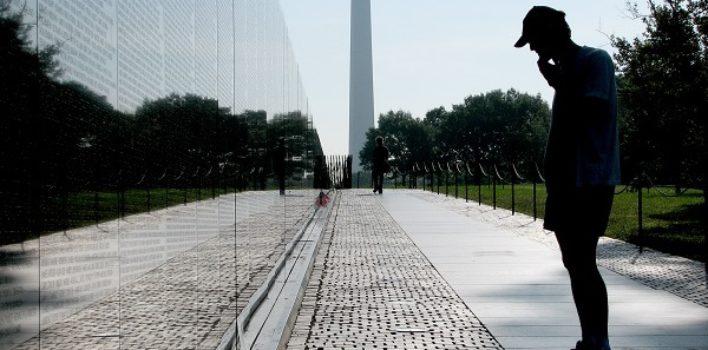Review| The Vietnam War – Part One
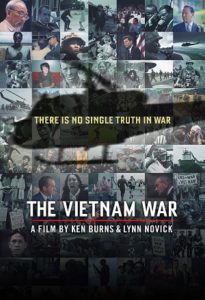 There are fewer eras in American history that are fraught with more controversy and consternation that the Vietnam War. It was a time of social and cultural change – most of it for the worse, in this author’s humble opinion. And even 40 years after it ended, the wounds of that era are still fresh for many.
There are fewer eras in American history that are fraught with more controversy and consternation that the Vietnam War. It was a time of social and cultural change – most of it for the worse, in this author’s humble opinion. And even 40 years after it ended, the wounds of that era are still fresh for many.
This time period has also produced classic films that are revered today – Apocalypse Now, Platoon, Born on the Fourth of July, and the like. These films, for the most part, have a definite slant on the war and it’s a mostly negative one that usually leans left.
This is what made me initially apprehensive about Ken Burns and Lynn Novick’s latest documentary series, The Vietnam War. While Burns’ early works are indeed fair and balanced to the subject matter they study (specifically his magnum opus, The Civil War), his more recent films have been glaringly biased to the left, with the worst being 2009’s The National Parks: America’s Best Idea.
I’m very happy to report that The Vietnam War is Burns’ best film in a while. It is a fair and comprehensive look at the war…to a point. Burns and his co-director Lynn Novick have crafted an excellent narrative of the events surrounding the war, providing much-needed context, setup, and thoughtful analysis – allowing those who lived the war from all sides to have a say. However, the film still has some annoying biases, even though both Burns and Novick assured us there wouldn’t be any.
Because this was an 18-hour series, there’s lots to talk about. I have divided my review into two parts. This first part will talk about the film itself and its execution. The second will go into the theme of the film, and its connection to our Savior.
Stuff I Liked
I’ve always been fascinated with American history, but for some reason, I have tended to steer clear of the Vietnam era. The only things I knew I learned from some of those movies, as well as documentaries on television. I really had just a passing interest in it. The whole situation was incredibly complicated and I wanted to devote some serious time and thought to it, which I rarely did until now.
 Ken Burns has a gift for capturing the basic narrative of a historical event and make it digestible (albeit in an hours-long format). What Burns and Lynn Novick have done is really boil the Vietnam period down to its essential narrative, making it easy to follow and understand. For the first time in my life, I really understood the war and all the players.
Ken Burns has a gift for capturing the basic narrative of a historical event and make it digestible (albeit in an hours-long format). What Burns and Lynn Novick have done is really boil the Vietnam period down to its essential narrative, making it easy to follow and understand. For the first time in my life, I really understood the war and all the players.
The music for The Vietnam War was a definite change from Burn’s past films. It included hits of the era (and I appreciated that these songs were used only when the narrative came into the years in which they were recorded) and captured the mood of the time. The original music by Trent Reznor and Atticus Ross (who created the excellent score for The Social Network) was amazing and full of raw emotion. Yo-Yo Ma and the Silk Road Ensemble provided some Asian-themed compositions for the Vietnamese sequences, which were also very well done.
The series’ final episode, “The Weight of Memory,” was my favorite. Like the final episode of Burns’ The Civil War, it was a masterful culmination of all the time, turmoil and emotion the audience had been through in the hours preceding. A great emotional catharsis that hit all the right notes and tied off all the narrative’s loose ends before speaking profoundly about the meaning of the war itself.
The sequences in the final episode about the making of the Vietnam War Memorial in Washington, D.C. were particularly moving. It served as the common meeting point for all the stories that had been told – a place of healing and reconciliation.
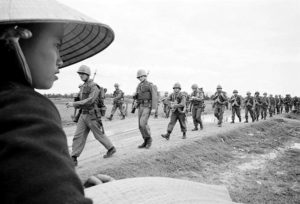 Hearing the stories of the people who lived the through war throughout the series (soldiers, politicians, spies, bureaucrats, anti-war protestors, Gold Star families, reporters, and more) was quite an experience and really made the film for me. They provided an on-the-ground authenticity which I appreciated. I could see in their eyes that many of them were still haunted by Vietnam. It made the history more emotionally real to me, and respect those veterans even more than I already did.
Hearing the stories of the people who lived the through war throughout the series (soldiers, politicians, spies, bureaucrats, anti-war protestors, Gold Star families, reporters, and more) was quite an experience and really made the film for me. They provided an on-the-ground authenticity which I appreciated. I could see in their eyes that many of them were still haunted by Vietnam. It made the history more emotionally real to me, and respect those veterans even more than I already did.
This brings me to what I liked most about The Vietnam War. It was Burns and Novick’s deliberate effort at fairness. Their intent was to remain as neutral as possible, and it was there, again, for the most part. They interviewed not just Americans, but also the Vietnamese from both North and South. We got to hear their stories and experiences, which brought a whole new dimension to the war few Americans have heard.
Stuff I Didn’t Like
Though Burns and Novick stated that they tried to remain neutral in their take on the Vietnam War, I saw several instances of bias and peculiar omissions. Most of these were relatively small but annoying. Others were completely aggravating.
The most egregious and inexplicable came during the Nixon years. The Richard Nixon Presidential Library posted a series of articles on their website illustrating some of the leaps in logic the filmmakers took to reach their conclusions about President Nixon’s intentions in Vietnam – selectively editing the taped White House conversations and passing off conjecture and speculation as fact. As a person who loves history and wants to get the facts (no matter which political side comes out looking good), this was very frustrating.
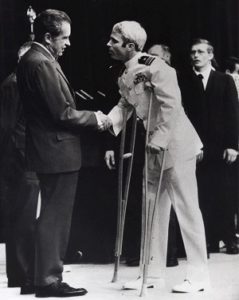
Then there were the interview omissions that were just peculiar. Burns and Novick deliberately decided to not interview Senator John McCain and former Secretary of State John Kerry for the documentary – even though they both served as advisors on the project and are specifically mentioned in the film. They also chose not to interview former Secretary of State Henry Kissinger, who is still alive and was at the center of the Vietnam policy toward the end of the war. The same went for Jane Fonda, the American actress who shamefully towed the propaganda line for the North Vietnamese.
Burns defended the interview choices by saying that he didn’t want these well-known figures to put their “spin” on events, and pointed out that there are many other people featured throughout the film with very interesting stories. While it is true that all of the people interviewed had amazing stories that deserved to be heard, Burns’ reasoning is intellectually dishonest. If Burns really wanted to be “fair,” he should have let all the people – especially ones featured so prominently as McCain, Kerry, Kissinger, and Fonda – be interviewed about their experiences and let the viewers decide. It’s not like he had any time constraints anyway; it’s an 18-hour series!
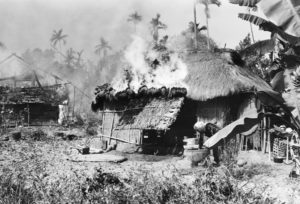
As I mentioned previously, Ken Burns has an amazing talent of making history come life through cinematic conventions. However, this principle was taken a bit too far in The Vietnam War, making for some strange sequences. The most egregious were the “freak-out” moments that occurred frequently throughout the film. Burns tried to simulate with the camera what the soldiers were going through emotionally during a battle with fast-cuts and volume modulation. It was too much and didn’t work.
The editing of one sequence particularly galled me. During his interview, Vietnam vet Ron Ferrizzi, became very passionate when recalling an encounter with an ignorant reporter. Burns and Buddy Squires’ horror-film-style editing (coupled with Reznor and Ross’ inappropriate musical effects) made Ferrizzi seem crazed and unhinged, as the film quickly cuts back-and-forth between Ferrizzi being calm and excited. It was very disturbing and disrespectful to Mr. Ferrizzi.
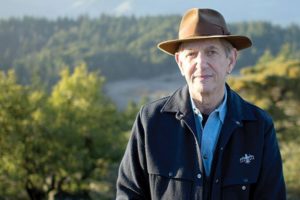
Peter Coyote is one of the worst documentary narrators ever. Coyote’s unemotional, sanctimonious intonations are the only artistic parts of the film that made it a slog to get through – and one has to listen to him because he’s dispensing all the historical information. Coyote has been narrating Burns and Novick’s films for the last few years, and he makes each one worse.
Actor Keith David, with his smooth, deep timbre, was the best narrator out of all of Burns’ films (The War, Mark Twain, Jazz, Baseball‘s “Tenth Inning”), with David McCullough (The Civil War) coming in at second place. Keith David should have done this film. It would have made all the mistakes and omissions easier to swallow.
Next time, I’ll delve into the spiritual side of The Vietnam War. Stay tuned!


